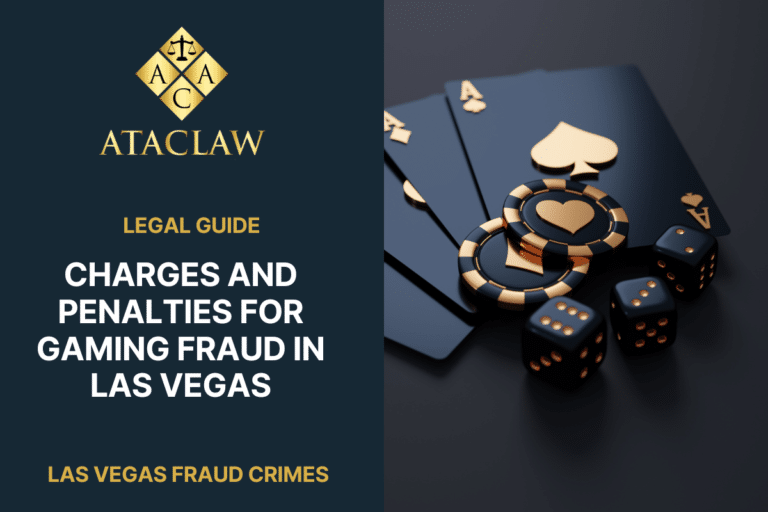In the glamorous world of Las Vegas, where fortunes are won and lost on the roll of a dice or the spin of a roulette wheel, the possibility of gaming fraud is an unfortunate reality. As a popular tourist destination and the gambling capital of the United States, law enforcement officials in Las Vegas take gaming fraud very seriously. This article explores the charges and penalties associated with gaming fraud in Sin City.
When it comes to gaming fraud, the casinos in Las Vegas have an array of surveillance measures in place to detect any illicit activities. From card counting to using hidden devices, individuals who engage in fraudulent practices can face serious consequences. The penalties for gaming fraud in Las Vegas can vary depending on the severity of the offense and the amount of money involved.
Understanding the charges and penalties for gaming fraud is essential for both visitors and locals in Las Vegas. Whether it’s partaking in illegal gambling schemes or cheating the system, those caught in the act can expect legal ramifications that can range from fines to imprisonment.
Join us as we delve into the world of gaming fraud in Las Vegas and shed light on the charges and penalties associated with this crime.
Types of Gaming Fraud
Gaming fraud in Las Vegas encompasses a wide range of deceptive practices aimed at unlawfully obtaining money or advantages in the gambling industry. One common type of gaming fraud is card counting, a technique used to gain an advantage in card games such as blackjack. While not illegal, casinos have the right to refuse service to individuals who employ this strategy. Other forms of gaming fraud include marked cards, collusion between players and dealers, and using hidden devices to manipulate the outcome of games.
Casinos in Las Vegas employ sophisticated surveillance technology to detect these fraudulent activities. Surveillance teams monitor the gaming floor, keeping an eye out for suspicious behavior. They use a combination of video surveillance, facial recognition systems, and data analysis to identify potential cases of gaming fraud. The goal is to maintain the integrity of the gaming industry and ensure a fair playing field for all patrons.
Consequences of Gaming Fraud
Engaging in gaming fraud can have severe consequences, both legally and financially. If caught, individuals can face criminal charges, which may result in fines, probation, or even imprisonment. In addition to legal repercussions, those involved in gaming fraud can also face civil lawsuits from the casinos they defrauded. These lawsuits can seek restitution for the damages caused by the fraudulent activity.
Furthermore, being convicted of gaming fraud can have long-lasting effects on an individual’s reputation and future employment prospects. In a city like Las Vegas, where the gaming industry is a major economic driver, being involved in fraud can make it difficult to find employment in the casino industry or related fields. The repercussions of gaming fraud extend far beyond the immediate legal penalties, making it a risky and ill-advised endeavor.
Legal Charges for Gaming Fraud in Las Vegas
The legal charges for gaming fraud in Las Vegas can vary depending on the specific offense committed. Common charges include cheating at gambling, conspiracy to cheat at gambling, and possession of cheating devices. Cheating at gambling is a broad charge that covers various fraudulent activities, including card manipulation, dice control, or tampering with electronic gaming machines. Conspiracy to cheat at gambling involves two or more individuals planning to defraud a casino, while possession of cheating devices refers to the possession or use of any device or equipment designed to manipulate the outcome of a game.
The penalties for these charges can range from misdemeanor to felony offenses, depending on the severity of the fraud and the amount of money involved. Misdemeanor charges typically result in fines and potential jail time of up to one year, while felony charges can lead to lengthier prison sentences. Repeat offenders or those involved in large-scale gaming fraud schemes are often subject to more severe penalties.
Penalties for Gaming Fraud Convictions
When it comes to gaming fraud convictions in Las Vegas, the penalties can be significant. For misdemeanor offenses, individuals can face fines ranging from a few hundred dollars to several thousand dollars. In some cases, probation may be imposed, requiring the individual to adhere to specific conditions and restrictions. Felony convictions for gaming fraud can result in substantial fines, reaching into the tens of thousands of dollars, and prison sentences ranging from one year to multiple years, depending on the severity of the offense.
In addition to the legal penalties, individuals convicted of gaming fraud may be required to pay restitution to the casino they defrauded. Restitution can involve reimbursing the casino for the financial losses incurred as a result of the fraudulent activity. These restitution amounts can be substantial, potentially reaching hundreds of thousands or even millions of dollars.
High-Profile Gaming Fraud Cases in Las Vegas
Over the years, Las Vegas has seen its fair share of high-profile gaming fraud cases. One notable example is the case of Richard Marcus, a former professional blackjack and baccarat player who became infamous for his cheating techniques. Marcus used sleight of hand tricks to switch high-value chips for lower-value ones, allowing him to win large sums of money dishonestly. His actions earned him the nickname “The Blackjack Bandit” and resulted in multiple convictions and significant financial penalties.
Another well-known case is that of MIT students who formed a card-counting team known as the “MIT Blackjack Team.” They used advanced mathematics and card-counting techniques to gain an edge over the casinos. While card counting is not illegal, the team was eventually banned from many casinos in Las Vegas and faced legal challenges related to their activities.
These high-profile cases serve as a reminder of the serious consequences individuals can face when engaging in gaming fraud in Las Vegas. The casinos and law enforcement agencies are vigilant in their efforts to detect and prosecute those who attempt to cheat the system.
How to Report Gaming Fraud in Las Vegas
If you witness or suspect gaming fraud in Las Vegas, it is essential to report it to the appropriate authorities. The Nevada Gaming Control Board (NGCB) is the regulatory body responsible for overseeing the gaming industry in the state. They have a dedicated enforcement division that investigates allegations of gaming fraud and other illegal activities.
To report gaming fraud, individuals can contact the NGCB’s Enforcement Division directly or submit a complaint through their website. It is crucial to provide as much detailed information as possible, including the date, time, location, and any relevant details about the suspected fraudulent activity. By reporting gaming fraud, you contribute to maintaining the integrity of the Las Vegas gaming industry and protecting the interests of both casinos and patrons.
Preventing Gaming Fraud in the Casino Industry
Preventing gaming fraud is a top priority for casinos in Las Vegas. They employ various measures to deter and detect fraudulent activities. One of the most effective methods is the use of surveillance technology. Casinos have extensive video surveillance systems that monitor gaming areas, capturing footage of every table and slot machine. These surveillance systems are backed by advanced analytics and facial recognition software, allowing the casinos to identify potential instances of gaming fraud accurately.
Additionally, casinos train their employees to be vigilant and knowledgeable about gaming fraud. Dealers, pit bosses, and security personnel receive training on how to spot suspicious behavior and identify potential fraudsters. Regular audits and checks are conducted to ensure compliance with gaming regulations and to detect any irregularities.
The casino industry also collaborates closely with law enforcement agencies to combat gaming fraud. By sharing information and coordinating efforts, they can effectively identify and apprehend individuals involved in fraudulent activities. This collaboration creates a strong deterrent and sends a clear message that gaming fraud will not be tolerated in Las Vegas.
The Role of Surveillance in Detecting Gaming Fraud
Surveillance plays a crucial role in detecting gaming fraud in Las Vegas. Casinos invest heavily in state-of-the-art surveillance systems that capture high-definition video footage of every gaming table and machine. These systems use advanced analytics to analyze player behavior, detect patterns, and identify potential instances of fraud. Facial recognition technology is also utilized to match individuals against databases of known fraudsters or banned players.
Surveillance teams monitor the gaming floor in real-time, looking for any suspicious activities or behaviors. They work closely with casino employees, who are trained to report any concerns or irregularities they observe. If a potential case of gaming fraud is identified, the surveillance team gathers evidence and works with law enforcement agencies to initiate an investigation.
The role of surveillance in detecting gaming fraud cannot be overstated. It acts as a powerful deterrent, knowing that every move is being watched and recorded. The sophisticated technology and skilled personnel employed by casinos in Las Vegas create a robust defense against fraudulent activities, ensuring the integrity of the gaming industry.
Conclusion: Importance of Combating Gaming Fraud in Las Vegas
Gaming fraud is a serious offense that undermines the integrity of the Las Vegas gaming industry. The charges and penalties associated with gaming fraud serve as a deterrent, sending a clear message that cheating the system will not be tolerated. Whether it’s card counting, using hidden devices, or partaking in illegal gambling schemes, those involved in gaming fraud can expect legal consequences that can range from fines to imprisonment.
Las Vegas casinos employ advanced surveillance technology and work closely with law enforcement agencies to detect and prevent gaming fraud. Through training, audits, and collaboration, they create a robust defense against fraudulent activities. Reporting suspected gaming fraud is essential to maintain the integrity of the industry and protect the interests of both casinos and patrons.
In a city built on the allure of gambling, it is crucial to uphold the highest standards of fairness and honesty. By combating gaming fraud, Las Vegas ensures that it remains the gambling capital of the United States, where visitors can enjoy the excitement of the casinos with confidence that the games are played fairly and honestly.
Do you need a Fraud Crimes Attorney in Las Vegas?
If You’re Facing Fraud Charges, We’re Here To Help.
Call us for help
We have answers for you
To learn more about Fraud laws in Las Vegas and how to get your self defense charge dismissed or to discuss a particular criminal case that you or someone you love is facing, Call ATAC Law firm for help to get your charges reduced or dismissed.
Contact us for a FREE phone meeting to discuss your case with what people are calling the best criminal defense attorney in Las Vegas.
At ATAC, our Las Vegas team of lawyers is here to work with you to help you through your case.
For Nevada Revised Statutes (NRS) related to legal matters, including sex crimes, fraud charges, DUI charges, domestic violence, and non-homicide self-defense, you can visit the official website of the Nevada Legislature or consult legal databases specific to the state. These resources will provide you with the most up-to-date and accurate information on the relevant statutes.
- Nevada Legislature Website: You can visit the official website of the Nevada Legislature at leg.state.nv.us. The website usually has an easy-to-navigate interface where you can search for specific NRS codes related to different legal categories.
- Legal Databases: Online legal databases such as Nevada Legal Forms or Justia may also provide access to the latest Nevada Revised Statutes.
- Legal Professionals: If you have specific legal questions or need assistance with legal codes, consulting with a legal professional, such as an attorney practicing in Nevada, is always a good idea.





